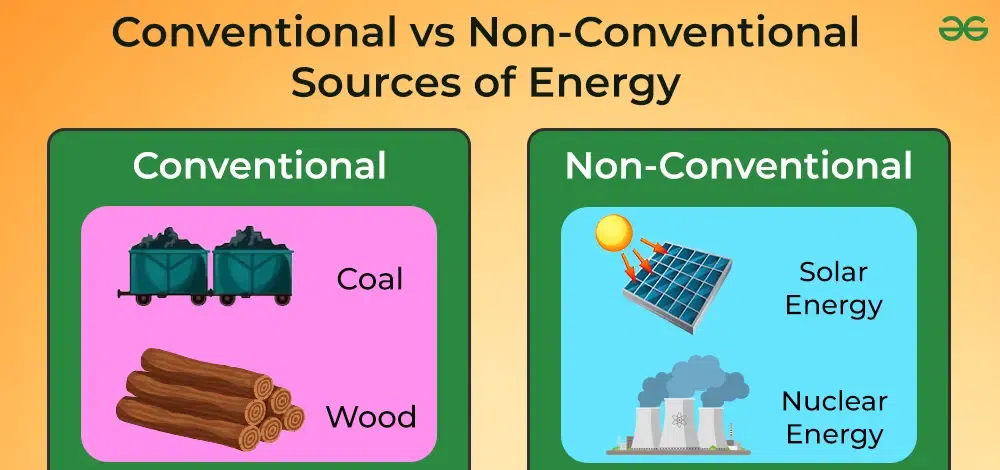Differentiate between Conventional and Non-Conventional Sources of Energy
Last Updated :
21 Jan, 2024
Conventional sources of energy are the traditional sources of energy that are generally bought and sold in the market and the non-conventional sources o energy are modern sources of energy. In the scenario of India, conventional sources are used with total disregard for the aspect of the environment, and the non-conventional sources are developed in the context of commercial energy and by keeping in mind the environment.
Energy is one of the main parts of the financial framework. In a creating economy, the energy request is high from areas like horticulture, industry, private and practical. Energy assets are a lot of vital for the presence of humanity. Energy is the basic input that is important for sustainable economic development and growth. Major sources of energy include conventional sources and non-conventional sources.

Conventional vs Non- Conventional Energy sources
Conventional Sources of Energy
Traditional wellsprings of energy are the normal energy assets that are routinely utilized for a long time and are acknowledged as fuel to create heat, light, food, and power.
The energy sources incorporate kindling, petroleum derivatives, cow compost cake, and so on. Of these sources, petroleum derivative is the best regular source, wherein fossil infers the remaining parts of plants and creatures, that got covered under the earth and changed into rocks throughout the long term. These non-renewable energy sources are coal, oil (petrol), and flammable gas.
Customary wellsprings of energy are by and large non-inexhaustible wellsprings of energy as the amassing or making of regular wellsprings of energy requires years, whenever they are taken advantage of or consumed. As these sources are utilized for a huge scope, the stores have been drained, and their option is difficult to come by.
At the point when we can’t reuse a wellspring of energy subsequent to utilizing it once we refer to them as “traditional wellsprings of energy” or “non-sustainable power assets”. They are the main traditional wellsprings of energy. These incorporate coal, petrol, flammable gas, and thermal power. Oil is the most broadly utilized wellspring of energy. Coal, petrol, and flammable gas represent around 90% of the world’s development of business energy and hydroelectric and atomic power represent around 10%.
Non-Conventional Sources of Energy
Normal assets like a breeze, tides, sun-oriented, biomass, and so forth produce energy which are known as “Non-traditional assets”. These are sans contamination and thus we can utilize these to create a spotless type of energy with practically no wastage.
As the utilization of energy develops, the populace relies increasingly more upon petroleum products like coal, oil, and gas step by step. There is a need to get the energy supply in the future since the costs of gas and oil continue ascending with each spending day. So we really want to utilize an ever-increasing number of sustainable wellsprings of energy. For the powerful double-dealing of non-ordinary sources, there has been a foundation of a different division to be specifically the “Branch of non-customary wellsprings of energy” by the public authority of India.
An option in contrast to customary wellsprings of energy is the non-regular wellsprings of energy, which accomplished fame lately, after the oil emergency in 1973 and from that point forward they are being used for a huge scope. The energy can be acquired from different sources like the sun, wind, organic squander, natural aquifers, tides, and so on to create intensity and power.
These are inexhaustible wellsprings of energy as well as contamination free. These sources are available in overflow in nature, and they are continually produced, so they can’t be depleted effectively, and utilized over and over.
Differentiate between Conventional and Non-Conventional Sources of Energy
| Conventional Sources |
Non-Conventional Sources |
| Ordinary wellsprings of energy are restricted |
Non-Conventional sources are bountiful. |
| Regular sources are non-sustainable. |
Non-Conventional wellsprings of energy are sustainable. |
| They dirty the environment |
They are sans contamination, i.e., they are eco well disposed |
| Ordinary sources are a costly method of energy |
Non-Conventional wellsprings of energy are less expensive. In any case, the underlying expense of non-ordinary sources is weighty. |
| These incorporate coal, oil, and power |
These incorporate sunlight-based energy, wind energy, biomass, and so on. |
| These are being utilized as different wellsprings of business energy over a significant stretch of time. |
The vast majority of these are just in the trial and error stage and are being utilized as different wellsprings of business energy just to a little degree. |
| In India, regular sources (coal and petrol specifically) are being utilized in all-out negligence to the climate. |
These are being created as wellsprings of business energy with the end goal of actually taking a look at ecological contamination. |
Related Links
- Non-conventional energy sources
- Conventional Energy
Frequently Asked Questions
Q 1. What is the difference between conventional and non-conventional sources of energy?
Answer-
Conventional energy sources are regular energy which is generated from fossil fuels, which include coal, oil, and natural gas. Green or renewable energy are those which are generated from sources like sun, wind.
Q 2. What are the advantages of conventional sources of energy sources?
Answer-
The advantage of conventional sources of energy is that the efficiency, as well as production expenses, are low.
Q 3. What are the advantages of non-conventional sources of energy?
Answer-
The advantage of non-conventional sources of energy is that it is considered to be an important part of renewable, pollution-free, and availability of them in abundance.
Q 4. What is the importance of non-conventional sources of energy?
Answer-
The importance of non-conventional sources of energy is that is considered to be of importance they are renewable, pollution free and environmental friendly.
Like Article
Suggest improvement
Share your thoughts in the comments
Please Login to comment...